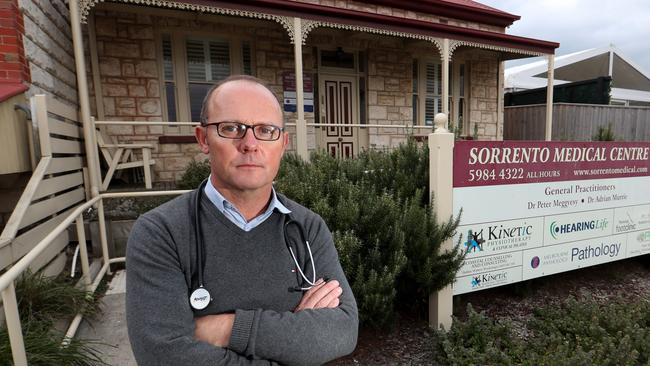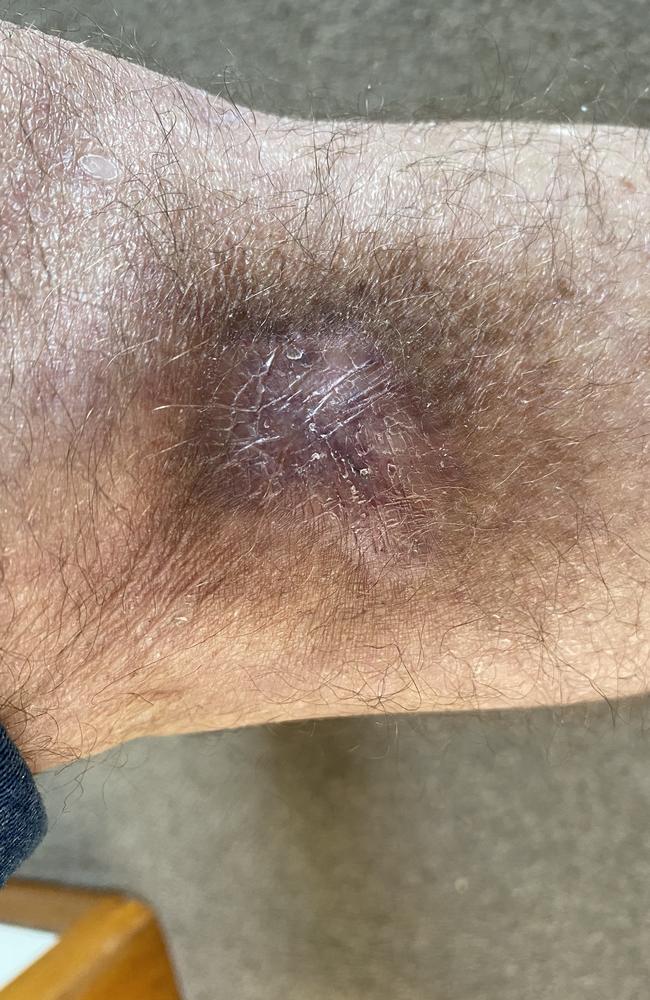Buruli ulcer bacteria found in possum poo years before human cases
Chris was bitten by a mosquito and ended up needing antibiotics and surgery. He’s calling for funding to fight the flesh-eating disease.

Conditions
Don't miss out on the headlines from Conditions. Followed categories will be added to My News.
The bacteria that causes a flesh-eating ulcer can be detected in possum faeces more than three years before cases emerge in people nearby, research has found, amid calls for more funding to fight the nasty condition.
Buruli ulcer, a skin disease caused by the bacterium Mycobacterium ulcerans, has been emerging in new areas across Victoria in recent years.
Batemans Bay on the NSW South Coast has recently been identified as a potential new hotspot for the ulcer, which has also been known to occur in the Northern Territory and Queensland.
In surveys conducted in Geelong, researchers identified the bacteria in possum faeces prior to clusters of human cases where there had previously been no infections recorded among people.
Possum detection preceded human cases by months to years, the paper published in the Emerging Infectious Diseases journal said.
The lag between the finding in poo samples and human cases could be up to 39 months.
Associate Professor Daniel O’Brien, director of infectious diseases at Barwon Health, said the study confirmed possums were involved in the spread to humans and that this surveillance was a vital tool for identifying areas at risk.

“It is hoped that a better understanding of the ulcer and the link between finding the bacteria in possums and the time before it may appear in humans, means we can use possum surveillance to identify areas that the disease may appear in next,” he said.
“This will allow health officials to identify and … educate communities and health practitioners around what to look for to allow rapid diagnosis and treatment, and also how to minimise the risk of catching it.
“With its pre-warning of risk areas, it provides a tool that may allow the commencement of activities that prevent disease emerging in humans in the first place.
“This is a vital step in understanding this disease that causes a lot of pain and suffering.”
Prof O’Brien said research was vital to better understanding and needed more funding.
“We hope with increased investment we can continue to work on ways to better prevent the disease and its spread, and to trial new medicines to improve treatment,” he said.
Barwon Health and CSIRO’s Australian Centre for Disease Preparedness were both involved in the study.
CSIRO’s Dr Kim Blasdell said applications had been made to fund possum vaccination research, after they appeared promising in mice.
“If we were able to get an oral bait vaccine vaccination scheme going … hopefully it would reduce human cases, but these possums get pretty bad disease as well,” she said.
“There could be benefits on even a national or global scale … you might actually be on your way to finding a vaccine that might be useful in people as well.”
Mosquitoes are also involved in transmission.

Chris Bailey, from the Geelong suburb of Belmont, said he developed a lesion on his leg after being bitten by a mosquito last year.
He took antibiotics and needed his dressing changed frequently.
“That was a bit of a drag,” he said.

“It became extremely painful… I could hardly put any pressure on my right foot.”
The 68-year-old, who underwent surgery, said people should remain vigilant in avoiding mosquito bites, and more funding needed to be put towards research and public awareness.
“It’s a serious infection that anyone can get — young or old,” Mr Bailey said.
More Coverage
Originally published as Buruli ulcer bacteria found in possum poo years before human cases





